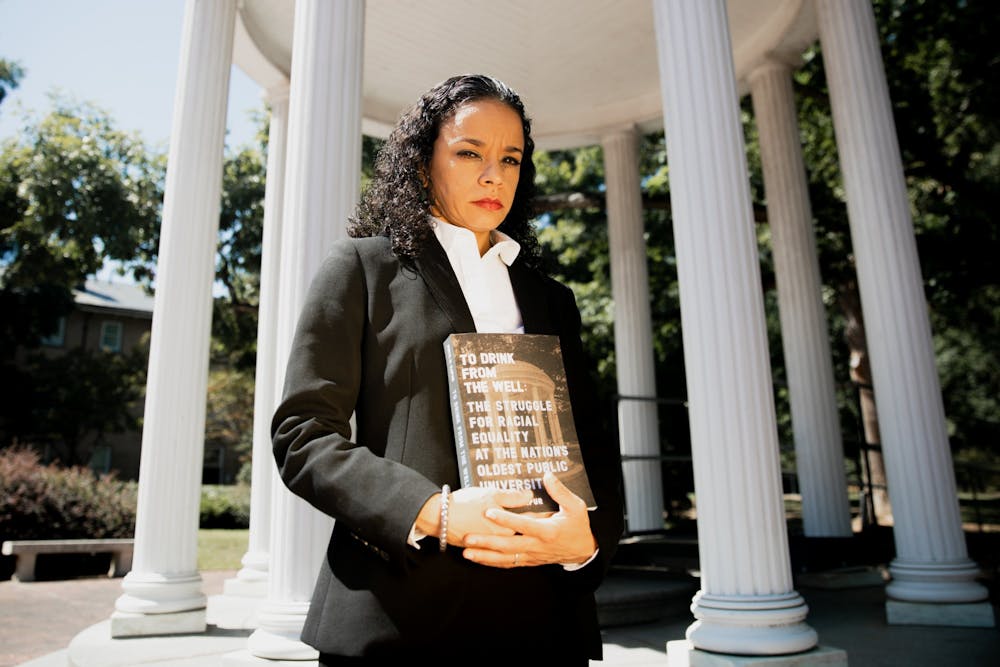Robin Miura, senior editor and associate publisher at Blair, the publishing company releasing Kapur’s book, said its eye-opening linear story moves away from a sugar-coated version of events.
“That's the version of the University history that we all like to tell ourselves, myself included,” Miura, who is a 1996 UNC graduate, said. “But the truth is darker than that."
Much of that history includes parallels with more recent University events, Kapur said.
The University made national news over the summer when the UNC Board of Trustees initially failed to offer tenure to Pulitzer-prize winning journalist Nikole Hannah-Jones, who was set to join the Hussman School of Journalism and Media faculty as its next Knight Chair in Race and Investigative Journalism. After significant protest from the campus community, the BOT voted to approved tenure for Hannah-Jones, but she turned the offer down, accepting a tenured position at Howard University instead.
Kapur said the Hannah-Jones controversy has remarkable similarities to events in the recent past, including the construction of a Black Cultural Center, the removal of the Silent Sam statue from campus and the renaming of campus buildings, especially Saunders Hall.
Sonja Haynes Stone – for whom the Center for Black Culture and History on campus is named – had her own fight for tenure while at UNC.
Stone was a member of the Black Cultural Center Planning Committee, but the battle for a freestanding building for the Center continued for years after her death in 1991. The Center's groundbreaking was in April 2001.
“We see the same elements – the University makes the wrong decision, they say no,” Kapur said. “Then they're pushed by struggle – sometimes it's a week of struggle, sometimes it's a protest and movement struggle. And then only by being forced do they make the moral decision.”
The campus community has been involved in recent University decision-making, including the removal of the names of white supremacists from several campus buildings last year, including Aycock Residence Hall, the Carr Building and the Student Stores. Community members were able to submit potential renaming suggestions during the spring semester.
Book impact
Bill Ferris, an emeritus professor of history at UNC, said the book serves as a road marker and a guide for how the University can become healthier and stronger in the future.
“This is a history of the University of North Carolina that brings it alive,” Ferris said. “And it brings it alive from the perspective of people who built the buildings, made the bricks, served the food and maintained the grounds, many of whom continue to work at the University today. It gives you a whole different perspective on what the University is built on.”
To get the day's news and headlines in your inbox each morning, sign up for our email newsletters.
Kapur said she hopes the book brings to light the injustices in the University’s past in a way that sparks discussion about acknowledgement and belonging.
“I hope that this begins a conversation about restorative justice,” she said. “But most of all, I hope it leads to students of color feeling like Carolina is their home because it was built brick by brick by their ancestors.”
Kapur will celebrate her book’s release on Sept. 21 with an on-campus event, “Behind the Veil: The Struggle for Racial Equality at the Nation’s Oldest Public University,” in partnership with UNC's Black Student Movement, the Chapel Hill-Carrboro branch of the NAACP and the Bull’s Head Bookshop in the UNC Student Stores.
"To Drink from the Well: The Struggle for Racial Equality at the Nation’s Oldest Public University" can be pre-ordered on Amazon, in local bookstores or through Bookshop.org.
@hannahgracerose
university@dailytarheel.com | elevate@dailytarheel.com



